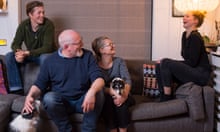Grown-up children who return to the family home after a period away, often at university, cause a significant decline in their parents’ quality of life and wellbeing, according to a revealing report which explores for the first time the impact of the so-called “boomerang generation” on family life in Europe.
The study by the London School of Economics (LSE) shows that after decades of growing independence among young adults and a dramatic decline in intergenerational co-residence, the trend is now shifting in the other direction.
And as grown-up children are increasingly driven back into the family home by rising housing costs and job insecurity, there are damaging consequences for parents.
Researchers found that couples, who have enjoyed a new lease of life as their children fly the nest with improved marital relationships and a fresh interest in new hobbies, may regard their offspring’s return as “a violation” of an exciting stage in their lives.
With about a quarter of young adults in the UK now living with their parents – the highest number since records began in 1996 and a trend replicated across Europe – the impact on family life appears to be widespread.
The LSE research, which is based on analysis of longitudinal data from the over-50s in 17 European countries between 2007-2015, is the first to look at the impact of the growing boomerang phenomenon. While the report acknowledges that co-resident adult children can be a source of emotional and practical support for older parents, it says they are also a source of conflict and stress in the family home.
Using a quality of life measure based on 12 key indicators, the study looked at participants’ sense of control, autonomy, pleasure and self-realisation. The scale ranged from 12 to 48 with higher scores equating to a better quality of life.
Researchers found that when an adult child returns home to a previously empty nest, the score dropped by an average of 0.8 point marking a “substantial” impact on wellbeing similar to what might be seen when someone develops an age-related disability.
Dr Marco Tosi, one of the authors of the study alongside Prof Emily Grundy of the LSE’s social policy department, said a similar trend could be seen across European countries, though the effect was more pronounced in Protestant than Catholic countries.
“Our work shows that in contexts where family orientations and welfare institutions foster individuals’ independence, returns home by adult children have negative implications for parents’ wellbeing.
“When children leave the parental home, marital relationships improve and parents find a new equilibrium. They enjoy this stage in life, finding new hobbies and activities. When adult children move back, it is a violation of that equilibrium.”
One mother, whose 23-year-old daughter returned to the family home and has remained there, responded to the report’s findings, saying: “I really love having my daughter at home but our role as parents is to want our children to be independent.
“Everything in my psyche says this young woman should be living independently. I feel everything in her psyche is saying: ‘I should be living independently.’ It hits at a very deep level.”
The study, Returns Home by Children and Changes in Parents’ Wellbeing in Europe, explains: “Over the past half-century, intergenerational co-residence has declined dramatically in western countries.
“However, this pattern has recently altered, and in some countries multigenerational co-residence has increased, a shift interpreted as a family response to high unemployment rates, poor job prospects and financial hardship among young adults.
“The findings show that returning home was correlated with a decline in parents’ quality of life when there were no other children in the parental home. Parents enjoy their independence when their children leave the home, and refilling an empty nest may be regarded as a violation of this life course stage.”
The report is published in the latest edition of the journal Social Science & Medicine and was based on data from France, Germany, Switzerland, Austria, Luxembourg, Belgium, the Netherlands, Sweden, Denmark, Italy, Spain, Portugal, Greece, Slovenia, the Czech Republic, Estonia and Poland.
Dr Tosi said although the study did not directly draw on data from the UK, there was very likely to be a similar effect, particularly as it was a Protestant country.








